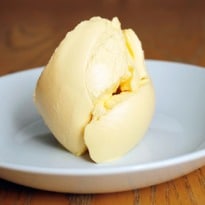Sales of margarine are in decline, due to a combination of reformulated recipes, price, health and taste. Do you defend marge, or is butter simply better?
Butter v marg: it's a fight that has gone on for decades. On one side, there's butter - rich, creamy, defiantly full-fat and made for millennia by churning the milk or cream from cattle. On the other, there's margarine: the arriviste spread invented in the 1860s. It might not taste delicious, and it doesn't sink into your toast like butter, but for decades margarine has ridden a wave of success as the "healthy" alternative.
No longer. Sales of margarine have plummeted in the last year, according to Kantar, with "health" spreads dropping 7.4% in sales. Flora has been particularly badly hit, losing £24m in sales, partly due to reformulating its recipe.
Meanwhile, butter is back in vogue. Brits bought 8.7% more blocks of butter last year, and 6% more spreadable tubs. This is partly due to the "narrowing price gap between butter and margarine," Tim Eales of IRItold The Grocer, but also to the home baking revival led by Mary Berry, Paul Hollywood and co. We're all sticking unsalted butter in our sponges these days.
A yen for natural, unprocessed produce could also be a factor. "Since all the food scandals of the last 10 years, people are thinking about where their food comes from - butter is perceived as 'pure'," says food writer Signe Johansen. But is marg really out for the count? Big brands are owned by powerful multinationals such as Unilever, with huge marketing budgets. Don't rule spreads out just yet.
Margarine was invented in 1869 by a French food scientist, Hippolyte Mège-Mouriès, who responded to a challenge by Napoleon III. Napoleon wanted to find a long-life alternative to butter to feed troops in the Franco-Prussian war. Mège-Mouriès mixed skimmed milk, water and beef fat to create a substance similar to butter in texture, if not in taste. He called it "oleomargarine" after margarites, the Greek word for pearls - a reference to its pearly sheen. In 1871 he sold the patent to Jurgens, a Dutch firm now part of Unilever.
Beef fat was soon replaced by cheaper hydrogenated and non-hydrogenated vegetable oils. "Margarine gained a foothold during the first world war," says food writer and historian Bee Wilson. "George Orwell wrote of the 'great war' that what he remembered most was not all the deaths but all the margarine. But at this stage people recognised it was an inferior substitute for butter: an ersatz food, like drinking chicory instead of coffee."
In the second world war, British margarine brands were legally required to add vitamins to their recipes. "The move in status to margarine as a health food, marketing itself as a superior alternative, happened after the war," says Wilson. Added "healthy" extras - vitamins, omega-3s, unpronounceables that lower your cholesterol - are still a mainstay of the market.
But while margarine has spent decades fighting butter on the health front, what about taste? "Margarine has never been able to replicate the flavour of true butter," says Johansen. This despite the fact many brands add milk and cream to their spreads. "I Can't Believe It's Not Butter"? Really? I can.
Unsurprisingly, it's hard to find a defendant of margarine among food writers and chefs. One of the few exceptions is Marguerite Patten, who a fan of baking with Stork. Indeed, Stork does make for wonderfully crisp shortcrust pastry.
Margarine has taken a bashing on the health front in recent years, too. Negative press about trans fats in the 00s saw many brands remove hydrogenated fats from their spreads and reformulate their recipes. Growing suspicion of processed foods has led many consumers to return to butter. As Johansen puts it: "If you want a healthy heart, eat more vegetables."
And yet, and yet. I'm looking at a tub of Pure Dairy-Free Soya Spread. It contains 14g saturated fat per 100g, compared to butter's 54%. For many consumers, such stats still outweigh taste when it comes to deciding what's on their toast. And what about vegans, and those with lactose intolerance? Margarine can fulfil needs that butter can't.
It will never win any taste awards, but there is still a place for margarine on the supermarket shelves - even if there isn't one for it in most food lovers' fridges.
Margarine: makes wonderfully crisp shortcrust pastry. Photograph: David Sillitoe for the Guardian







